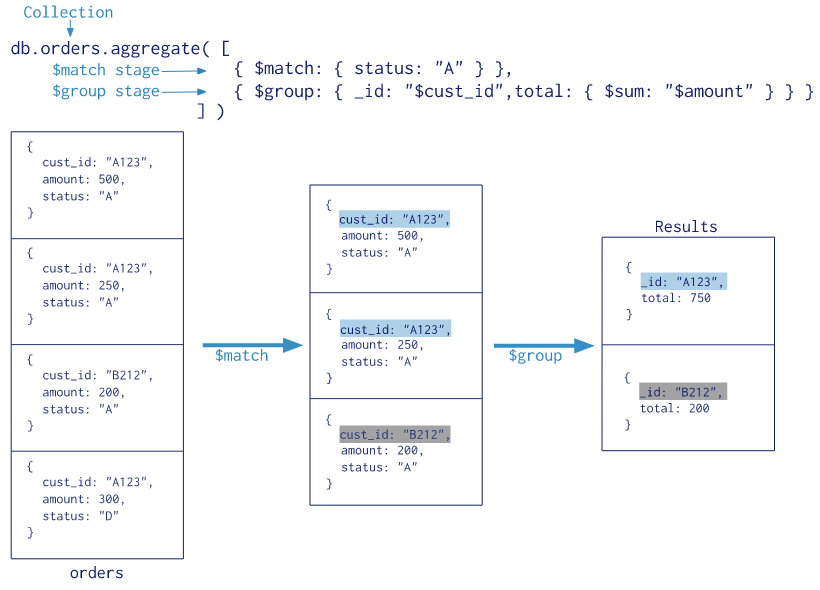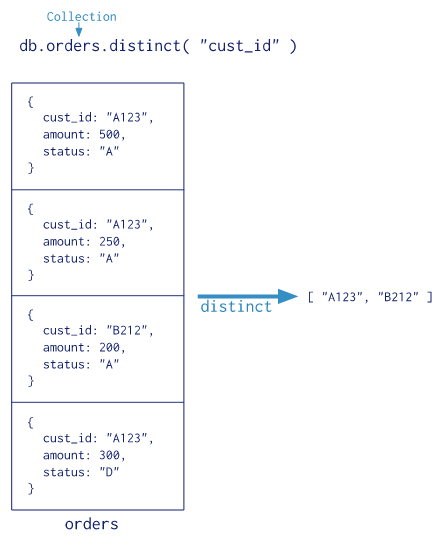mongodb与sql聚合对应图 M - CSDN博客 http://blog.csdn.net/u011930016/article/details/49422425
|
SQL Terms, Functions, and Concepts |
MongoDB Aggregation Operators |
|
WHERE |
|
|
GROUP BY |
|
|
HAVING |
|
|
SELECT |
|
|
ORDER BY |
|
|
LIMIT |
|
|
SUM() |
|
|
COUNT() |
|
|
join |
No direct corresponding operator; however, the $unwindoperator allows for somewhat similar functionality, but with fields embedded within the document. |
实例:
[td]
|
SQL Example |
MongoDB Example |
Description |
|
SELECT COUNT(*) AS countFROM orders |
db.orders.aggregate( [ { $group: { _id: null, count: { $sum: 1 } } }] ) |
Count all records fromorders |
|
SELECT SUM(price) AS totalFROM orders |
db.orders.aggregate( [ { $group: { _id: null, total: { $sum: "$price" } } }] ) |
Sum theprice field from orders,这个非常有用,看官方说明,说_ID是必须,但没想到可以为NULL, |
|
SELECT cust_id, SUM(price) AStotalFROM ordersGROUP BY cust_id |
db.orders.aggregate( [ { $group: { _id: "$cust_id", total: { $sum: "$price" } } }] ) |
For each uniquecust_id, sum the pricefield. |
|
SELECT cust_id, SUM(price) AStotalFROM ordersGROUP BYcust_idORDER BY total |
db.orders.aggregate( [ { $group: { _id: "$cust_id", total: { $sum: "$price" } } }, { $sort: { total: 1 } }] ) |
For each uniquecust_id, sum the pricefield, results sorted by sum. |
|
SELECT cust_id, ord_date, SUM(price) AS totalFROM ordersGROUPBY cust_id,
ord_date |
db.orders.aggregate( [ { $group: { _id: { cust_id: "$cust_id", ord_date: "$ord_date" }, total: { $sum: "$price" } } }] ) |
For each uniquecust_id,ord_dategrouping, sum the pricefield. |
|
SELECT cust_id, count(*)FROMordersGROUP BY cust_idHAVING count(*)> 1 |
db.orders.aggregate( [ { $group: { _id: "$cust_id", count: { $sum: 1 } } }, { $match: { count: { $gt: 1 } } }] ) |
For cust_idwith multiple records, return thecust_id and the corresponding record count. |
|
SELECT cust_id, ord_date, SUM(price) A2S totalFROM ordersGROUPBY cust_id,
ord_dateHAVING total > 250 |
db.orders.aggregate( [ { $group: { _id: { cust_id: "$cust_id", ord_date: "$ord_date" }, total: { $sum: "$price" } } }, { $match: { total: { $gt: 250
} } }] ) |
For each uniquecust_id,ord_dategrouping, sum the pricefield and return only where the sum is greater than 250. |
|
SELECT cust_id, SUM(price) astotalFROM ordersWHERE status ='A'GROUP BY cust_id |
db.orders.aggregate( [ { $match: { status: 'A' } }, { $group: { _id: "$cust_id", total: { $sum: "$price" } } }] ) |
For each uniquecust_id with status A, sum the pricefield. |
|
SELECT cust_id, SUM(price) astotalFROM ordersWHERE status ='A'GROUP BY cust_idHAVING total > 250 |
db.orders.aggregate( [ { $match: { status: 'A' } }, { $group: { _id: "$cust_id", total: { $sum: "$price" } } }, { $match: { total: { $gt: 250 } } }] ) |
For each uniquecust_id with status A, sum the pricefield and return only where the sum is greater than 250. |
|
SELECT cust_id, SUM(li.qty) asqtyFROM orders
o, order_lineitem liWHERE li.order_id = o.idGROUP BYcust_id |
db.orders.aggregate( [ { $unwind: "$items" }, { $group: { _id: "$cust_id", qty: { $sum: "$items.qty" } } }] ) |
For each uniquecust_id, sum the corresponding line item qtyfields associated with the orders. |
|
SELECT COUNT(*)FROM (SELECT cust_id,
ord_date FROM orders GROUP BYcust_id, ord_date) as DerivedTable |
db.orders.aggregate( [ { $group: { _id: { cust_id: "$cust_id", ord_date: "$ord_date" } } }, { $group: { _id: null, count: { $sum: 1 } } }] ) |
Aggregation — MongoDB Manual https://docs.mongodb.com/manual/aggregation/
Aggregation Pipeline

Map-Reduce

Single Purpose Aggregation Operations
